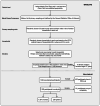Individual-, social- and policy- factors associated with smoking cessation among adult male cigarette smokers in Hanoi, Vietnam: a longitudinal study
- PMID: 37770890
- PMCID: PMC10540420
- DOI: 10.1186/s12889-023-16781-7
Individual-, social- and policy- factors associated with smoking cessation among adult male cigarette smokers in Hanoi, Vietnam: a longitudinal study
Abstract
Background: Nearly one-in-two Vietnamese men smoke cigarettes placing them among the highest tobacco consumers in the world. Despite the need for smoking cessation to curb the burden of tobacco-related diseases in Vietnam, this rate remains at less than 30%. Therefore, this study examines individual-, social- and policy factors associated with smoking cessation among adult male smokers in Vietnam.
Methods: We established a longitudinal International Tobacco Control study of male smokers in Hanoi, Vietnam, in September 2018. This paper analyses 1525 men who participated in baseline and one-year follow-up. We applied a weighted multivariable logistic regression to examine the association between smoking cessation and individual-, social- and policy predictors.
Results: At follow-up, 14.8% of participants had quit smoking for at least 30 consecutive days during the last year. Among the persistent smokers, 56.6% expressed intention to quit smoking. Factors associated with smoking cessation included a lower number of cigarettes smoked per day (aOR = 0.96, 95% CI: 0.94, 0.99) and having several attempts to quit smoking (aOR = 2.16, 95% CI 1.13, 4.12). Intention to quit smoking was associated with multiple quit attempts, a chronic condition diagnosis, more tobacco-related knowledge, greater self-efficacy, and more worries about their future health. The perceived impact of smoke-free policy and health warning labels were positively associated with intention to quit at any stage.
Conclusions: Interventions aimed at increasing smoking cessation should focus on all aspects of individual, social, and policy factors. Persistent smokers are more motivated to quit if they have made multiple quit attempts, more self-efficacy of quitting and worried about their future health, indicating that increasing smokers' beliefs and knowledge may be important for behavioural change. Health warning labels and tobacco taxation policies should be maintained and promoted as they are perceived to be particularly useful for persistent smokers' intention to quit.
Keywords: Cessation; Intention to quit; Policy; Social behavior.
© 2023. BioMed Central Ltd., part of Springer Nature.
Conflict of interest statement
The authors declare no competing interests.
Figures
Similar articles
-
The association between viewing cigarette health warning labels and intention to quit smoking among Chinese adult smokers: support for including health outcome content and culturally specific messages.BMC Public Health. 2023 May 11;23(1):866. doi: 10.1186/s12889-023-15718-4. BMC Public Health. 2023. PMID: 37170086 Free PMC article.
-
The Short-Term and Long-Term Associations Between Receiving Tobacco Discounts or Coupons and Smoking Cessation Among U.S. Adult Cigarette Smokers With Intention to Quit.Nicotine Tob Res. 2023 Mar 22;25(4):699-708. doi: 10.1093/ntr/ntac216. Nicotine Tob Res. 2023. PMID: 36124654 Free PMC article.
-
Association between current cigarette prices and cessation behaviors among male adult smokers: findings from 2018 to 2020 ITC Vietnam surveys.BMC Public Health. 2024 Aug 22;24(1):2278. doi: 10.1186/s12889-024-19689-y. BMC Public Health. 2024. PMID: 39174939 Free PMC article.
-
Exploring attitudes towards smoking behaviour and cessation among hospitalised smokers via a socio-ecological framework: A scoping review.Addict Behav. 2021 Nov;122:107040. doi: 10.1016/j.addbeh.2021.107040. Epub 2021 Jul 2. Addict Behav. 2021. PMID: 34246988
-
How effective is the plain packaging of tobacco policy on rates of intention to quit smoking and changing attitudes to smoking?ANZ J Surg. 2018 Sep;88(9):825-830. doi: 10.1111/ans.14679. Epub 2018 Jun 5. ANZ J Surg. 2018. PMID: 29873162 Review.
Cited by
-
Associations of sociodemographic and smoking characteristics with intention to quit among Chinese adults aged 20-69 years who smoke: Findings from nationwide China Health Literacy Survey during 2018-19.Prev Med Rep. 2024 Nov 26;49:102933. doi: 10.1016/j.pmedr.2024.102933. eCollection 2025 Jan. Prev Med Rep. 2024. PMID: 39691356 Free PMC article.
-
Primary Prevention of Cardiovascular Disease in Asia: Opportunities and Solutions: A Narrative Review.JACC Adv. 2025 Apr;4(4):101676. doi: 10.1016/j.jacadv.2025.101676. Epub 2025 Mar 22. JACC Adv. 2025. PMID: 40120215 Free PMC article.
-
Peer Texting to Promote Quitline Use and Smoking Cessation Among Rural Participants in Vietnam: Randomized Clinical Trial.Int J Public Health. 2024 Apr 8;69:1606941. doi: 10.3389/ijph.2024.1606941. eCollection 2024. Int J Public Health. 2024. PMID: 38651035 Free PMC article. Clinical Trial.
References
-
- Viet Nam Steering Committee on Smoking and Health, World Health Organization, Ha Noi Medical University, et al. Global Adult Tobacco Survey (GATS) Vietnam 2015. Statistical Publishing House. 2015.
-
- Viet Nam Steering Committee on Smoking and Health, World Health Organization, Ha Noi Medical University, et al. Global Adult Tobacco Survey (GATS) Vietnam 2010. Statistical Publishing House. 2010.
-
- WHO global report on trends in prevalence of tobacco use 2000–2025, Third Edition. https://www.who.int/publications-detail-redirect/who-global-report-on-tr.... Accessed 27 Apr 2023.
-
- WHO. WHO report on the global tobacco epidemic 2021: Addressing new and emerging products. Geneva: World Health Organization; 2021.
-
- CDCTobaccoFree. Benefits of Quitting. Centers for Disease Control and Prevention. 2021. https://www.cdc.gov/tobacco/quit_smoking/how_to_quit/benefits/index.htm. Accessed 27 Apr 2023.
Publication types
MeSH terms
Grants and funding
LinkOut - more resources
Full Text Sources
Medical



